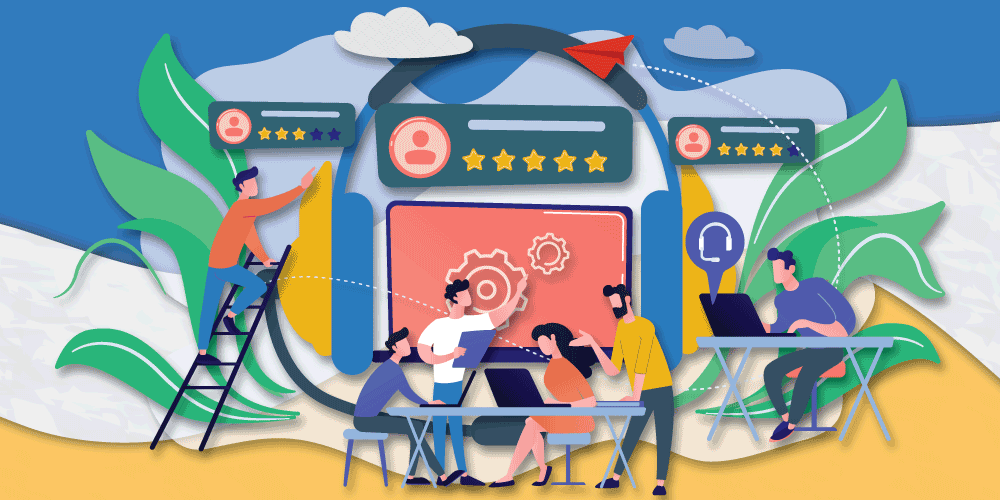How Learning management systems can support the workforce of tomorrow
Written by cezar | On January 17, 2023
 It is no secret that the training and development of employees is a key factor to the success of any organization. As such, upskilling and reskilling serve as a top priority for business leaders globally, with 58% of companies believing that closing skill gaps is a priority since the start of the global pandemic. However, according to Gartner, 70% of employees feel they lack the skills they need to effectively do their jobs and 64% of managers believe that their employees are unready for future skills requirements. This is where learning management systems come into the picture. An LMS in an organization can mitigate inefficiencies, centralize workplace operations, and improve workplace productivity by 20 to 25%.
It is no secret that the training and development of employees is a key factor to the success of any organization. As such, upskilling and reskilling serve as a top priority for business leaders globally, with 58% of companies believing that closing skill gaps is a priority since the start of the global pandemic. However, according to Gartner, 70% of employees feel they lack the skills they need to effectively do their jobs and 64% of managers believe that their employees are unready for future skills requirements. This is where learning management systems come into the picture. An LMS in an organization can mitigate inefficiencies, centralize workplace operations, and improve workplace productivity by 20 to 25%.
What is LMS?
LMS or learning management system is a software that enables organizations to create, organize, manage, deliver, and track training and development courses and programs. It is a gathering point for accessing and storing information that can help employees learn conveniently and efficiently.
Learning assets are uploaded and organized in the server of an LMS with users authenticated and managed in interacting with the program. Users of the software such as students and instructors can access the LMS through a user interface, usually on a web browser. You can find thousands of high-quality LMS programs available on the market. As such, organizations must consider their goals and objectives when considering what LMS to use because the right program can greatly increase the skills of your employees and the overall productivity of your company.
5 Ways Learning Management Systems Supports the Workforce
1. Makes Training and Development Flexible
Learning management systems would provide quick, convenient, and easy to access learning programs that are often self-directed. This allows for the freedom to choose personalized training programs and give employees the ability to proceed with their learning at their own pace.
This solves the number one hurdle that employees face in their learning, which according to LinkedIn Learning, is the employees’ lack of time to undergo any training programs. An LMS would easily solve this challenge by making training and development programs available to employees anywhere and anytime.
This flexibility provides more learning opportunities for employees so that they do not have to wait for classes that fit their busy work schedules to develop vital skills that they need to succeed in their job roles.
Learning management systems would also provide the flexibility of mobility. It allows for easy movement with the learning materials because LMS allows easy access to the content as long as a user has an internet connection on any type of device. Users can access the learning system in the comfort of their homes or on the go through their mobile devices.
2. Centralizes Learning Management Systems
Learning management systems would serve as the hub to hold all the learning materials in one place to save time and would also help with better accessibility for both learners and educators. Since LMS stores all the resources in the same location, backtracking to a specific course when needed or finding the right learning material is easier and more convenient.
Additionally, courses on LMS are curated and created mostly for teams or even entire organizations. This is why, a centralized learning system is equipped to handle and cater to each person’s needs, questions, and feedback.
Tracking the learning progress of a group can be difficult, especially when it is in a remote or hybrid environment. With learning management systems, educators can streamline training management by assigning roles, tracking group progress, and sharing documents that team members can use to enhance their skills and knowledge.
3. Personalizes the learning journey
An LMS would allow organizations to personalize the training and development experience for each employee. A learning management system can help employee skill development through the use of training in new tools that enable more efficient work performance, and in addressing skill gaps, with each employee having specific needs and preferences. As such, personalized learning is efficient and effective in upskilling employees. In fact, according to a LinkedIn Report, 80% of Gen Z and 79% of Millennials said that they value personalized learning.
Additionally, a more personalized learning approach will empower employees to take more control of their careers and guide their growth within the organization. Personalizing the learning experience allows employees to work at their own pace and take charge of their learning.
An LMS makes it easy for educators to use materials in a variety of ways, like; books, videos, games, and quizzes to make it more appealing to each specific learner. The developmental program could be adjusted based on the progress or needs of the learner.
4.Enhances Communication and Collaborative Learning
According to a LinkedIn learning report, employees would prefer to learn with their colleagues, instead of learning alone. In the previously stated report, 91% of respondents said being more successful when learning with others, and 92% reported learning with others would create a sense of belonging.
An LMS makes it easy to design and create collaborative learning experiences even when employees are not together in the same classroom. Learning management systems would facilitate communication and training through features like video conferencing, real-time chat, forums, and screen sharing which makes it possible for employees to contact one another and benefit from each other’s expertise remotely.
Additionally, collaborative tools could allow employees from different offices or departments to meet and learn from co-workers from across the organization, which can greatly improve cross-departmental communication and collaboration.
5.Reduces Employee Turnover Rates Learning Management Systems
The last value of a learning management system is its ability to boost employee satisfaction and reduce turnover rates. An LMS would make it easier for employees to participate in online training and development programs to get the resources they need to upskill themselves, improve confidence in the workplace and enhance overall work productivity.
When organizations invest in employees, they are more likely to stay because they feel valued and appreciated. This increase in employee morale would also lead to higher levels of employee engagement, leading to increased work efficiency and job satisfaction.
Partner with to SSA Philippines to leverage the power of learning management systems for your organization and gain all the previously mentioned benefits! The right LMS can help you succeed and reach organizational goals. We can tailor your LMS to meet your specific needs and requirements for upskilling your workforce.
Related articles


